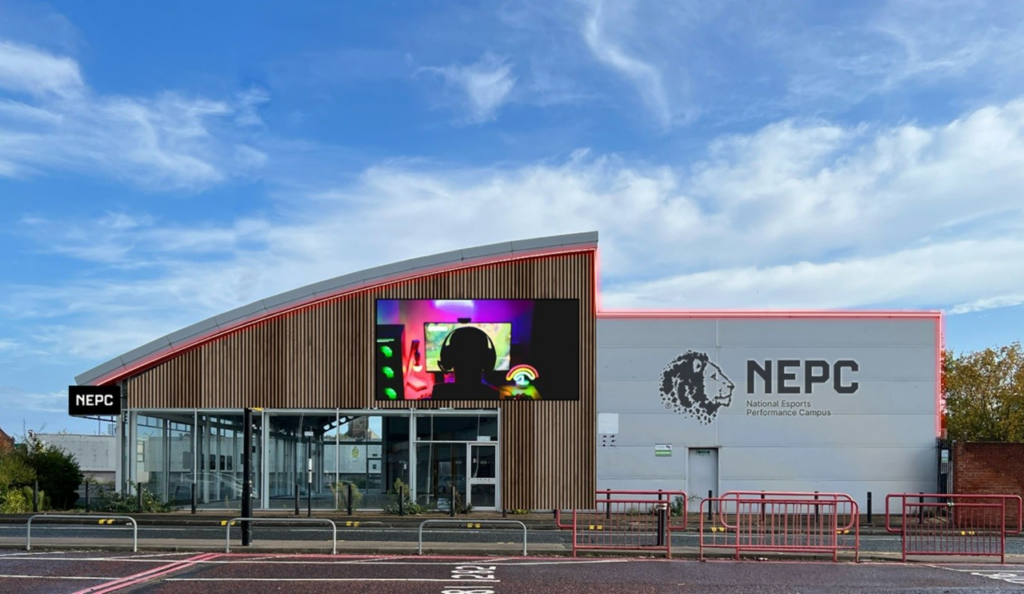Globally SportsTech is booming, with the UK sector also experiencing significant growth thanks to digital adoption in sport alongside immersive tech and artificial intelligence.
With its mix of academic expertise, cost-effective accommodation, quality of life, and access to talent, North East England is primed for esports and SportsTech companies looking to expand operations.
Specialist facilities such as the national British Esports campus, National Innovation Centre for Data and PROTO, plus world-leading facilities within our local universities, including the National Horizons Centre, offer companies unique opportunities for collaboration and research and development.
Below are some areas where the North East offers great opportunities for investors to work with local expertise.
Esports
North East England is a growing force in the Esport market, boasting fantastic courses, meet-ups and companies such as Newcastle-based Viperio and Hitmarker, the largest gaming and Esports jobs platform in the world.
The region is fast becoming an esports trailblazer with the national esports body, the British Esports Federation, set to open a performance and education campus in Sunderland. The campus will provide access to training, equipment and investment, as well as a base for the Great Britain Esports team. The centre, along with courses provided by local colleges and the University of Sunderland, will make the region a national Esports hub.
In addition, an £8million state-of-the-art Esports arena recently opened in Newcastle. The arena is part of the Newcastle United Foundation’s NUCASTLE community hub and will support Newcastle College’s new Esports study programme.
Durham University provides a designated Esports space for teams to play and practice, as well as providing gaming hardware and hosting events. The University also partners with LDN UTD allowing Durham students to benefit from joint tournaments, professional player talks and insights.

Immersive Tech in the North East
The North East also enjoys a growing reputation for Immersive Tech. It’s already home to a number of exciting specialist companies providing solutions to an impressive list of global clients. In addition, it boasts specialist facilities such as PROTO, the first digital production facility of its kind in Europe.
PROTO has become a home to innovative tech start-ups, giving access to cutting-edge digital production technologies. The facility offers subsidised access for SMEs to a motion capture stage and foley studio. It also offers a photogrammetry stage enabling full digital capture of people and movement for performance analysis and data capture.
The recently launched Immex City pilot programme brings new virtual production capabilities to PROTO, enabling hands-on research and training and skills development opportunities for the SportsTech sector. The virtual production test stage links to a sister stage in Guildford allowing simultaneous productions to take place which can be live-streamed via 5G. These are the UK’s only two facilities of their kind.
University expertise and facilities
The region’s five universities and excellent higher education colleges provide a strong pipeline of talent for investors in SportsTech, with 67,000 students studying Science, Technology, Engineering and Mathematics subjects.
Local education institutions and delivery partners offer access to academics, specialist research groups and facilities, as well as courses in emerging technology, Esports, artificial intelligence, machine learning, immersive tech and space science.
With significant expertise and research for SportsTech investors to tap into, new products are also being developed. These include:
Teesside University
Teesside University’s cutting-edge facilities and teaching has helped numerous international athletes and sports stars with their training and development. Its integrated multi-disciplinary approach ensures that the research and expertise which underpins the work they do with elite athletes can also be applied across multiple settings, benefiting students and delivering real impact in shaping the future of health, care and wellbeing.
In terms of product development, Pro Sport Support Ltd, based in Huddersfield has developed its AMAT (Athletic Movement Analysis Tool) training platform as part of a Knowledge Transfer Partnership (KTP) with Teesside University. The platform uses motion capture technology to investigate a range of movements in young athletes.
The technology, more commonly found in gaming systems like the Xbox, provides an objective performance assessment.
Problematic areas can be identified immediately, and a bespoke training plan created automatically using AMAT exer-gaming. This allows athletes to access exercise animations specific to their requirements.
The University also has a new £36.9million science, health and medical facility, BIOS, set to open next year. This promises to deliver further exciting opportunities for SportsTech investors.

Durham University
Durham University is leading an interdisciplinary research programme using state-of-the-art wearable telemetry to advance understanding of concussion and sub-concussions in contact sports (for example Rugby). It has a specialism in injury/data analytics offering crucial insights into injury mechanisms. This is achieved via a fusion of sports science, bioscience, psychology, and mathematical science expertise, and through work with industry partners such as those in telemetry and biomarker analysis.
Northumbria University
Northumbria University’s Sport Central is a £30million state-of-the-art facility incorporating a range of laboratories and research suites.
It is a hub for significant expertise in research and development in sport, exercise and physical activity technology. Whilst there is a focus on sport and human performance, much of the research also investigates health and wellbeing and also human-computer interaction.
Northumbria benefits from large and well-equipped internationally competitive laboratories conducting research in sport, exercise and rehabilitation. The University also has specific relevant research groups such as Optimising Human Performance, Promoting and Preserving Health and Wellbeing, and Wearables.
In addition, all staff have dedicated office space equipped with specialised hardware and software such as Matlab, R and Spike2.
Sunderland University
The University’s Sports Sciences courses are ranked 15th in the UK (The Guardian University league tables, 2021). Sunderland’s outstanding facilities feature laboratories with the latest fitness state-of-the-art equipment and technology. This includes a Clinical Rehabilitation and Exercise Therapy Suite 360 and a Human Performance Lab 360.
One example of its research into sensor data and motion capture is a recent PHD project involving the visualising of motion sensor data, and the design and evaluation of a horse rider assessment interface. The project considered the measurement of hip angle and pelvic orientation in the assessment of asymmetry in riders.
Newcastle University
The National Innovation Centre for Data runs projects with organisations to help acquire new skills and innovate through data. It supports SportsTech companies in harnessing data and works with academics to do further research and development, bringing new products to market more quickly.
There is also a new multimillion-pound facility at the university, equipped with a 34-camera motion capture system, multiple three-dimensional force plates, surface electromyography and high-specification computers to capture and model human movement.
The room provides one of the largest instrumented spaces in the UK (40m x 15m x 10m) for performing detailed analysis of human movement. The University uses the space to create visualisations of the body’s inner workings of the body. Team-sport athletes and their physios then use the data to help minimise the risk of injury.
Newcastle University also uses its motion capture space for product development. For example, an ongoing Innovate UK project with Tonus.com is developing an AI-based bodysuit for real-time motion capture and assistance to aid prevention and rehabilitation in healthcare and sporting contexts.
Human Trak is another product brought to market thanks to the university’s markerless and wearable sensor technology. It uses objective data to help athletes and personnel move better, perform better and return to play faster with the HumanTrak Movement Analysis System. Taking the guesswork out of common movement assessments, HumanTrak can see what the eye can’t and focuses on improving what’s most important.

Overall, North East England’s Digital and Tech sector is making waves with world class innovation and a global reach. The region offers clear opportunities for esports and SportsTech companies to access state-of-the-art facilities, academic specialist research plus the knowledge and pipeline of local talent.
Contact digital specialist Rachel Burdis for more information
Posted in: Blog, Digital and Tech, Life Sciences
